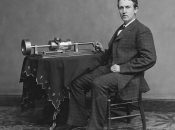Josephine Cochrane (1839–1913) was an American inventor and entrepreneur best known for inventing the first practical mechanical dishwasher. Born on March 8, 1839, in Ashtabula County, Ohio, she came from a family with a strong background in engineering and innovation.
Cochrane’s invention of the dishwasher was motivated by practicality and a desire to simplify household chores. She was frustrated by the chipping of her fine china and the inefficiency of hand washing dishes. In 1886, she designed a machine with a motor, a water wheel, a boiler, and wire compartments for holding dishes. The machine used high-pressure hot water to clean dishes, effectively automating the washing process.
After receiving a patent for her invention in 1886, Cochrane founded the Garis-Cochran Dish-Washing Machine Company to manufacture and market her invention. Her dishwasher was initially targeted at commercial establishments like hotels and restaurants. The machine garnered attention and acclaim for its efficiency, speed, and ability to reduce breakage of dishes.
Cochrane’s invention marked a significant step forward in domestic technology and set the stage for the modern dishwasher. Her design laid the groundwork for subsequent improvements in home appliances that would revolutionize housework and domestic life. Despite facing challenges such as financial difficulties and competition, Josephine Cochrane’s innovation earned her a lasting place in history as a pioneering inventor who transformed the way households approach the task of dishwashing.

Josephine Cochrane in Stamp of Romania
Let’s take a look at these 26 interesting facts about Josephine Cochrane to know more about her.
- Josephine Garis Cochrane was born on March 8, 1839, in Ashtabula County, Ohio.
- She was the granddaughter of John Fitch, an inventor who is credited with creating the first successful steamboat in the United States.
- Cochrane’s family had a tradition of engineering and invention, which influenced her interest in mechanics and innovation.
- She was educated at a private school in Illinois and later attended a college preparatory school.
- Cochrane was an avid reader and developed a strong interest in science and technology.
- She married William Cochran (later changed to Cochrane) in 1856 and had two children.
- Following her husband’s death, Cochrane was left with financial responsibilities, prompting her to explore ways to support herself.
- She embarked on the invention of the mechanical dishwasher after growing frustrated with the breakage of her fine china during hand washing.
- Cochrane’s design used a motor, a water wheel, a boiler, and compartments to hold dishes.
- She received a patent for her invention on December 28, 1886.
- The dishwasher used high-pressure hot water to clean dishes, making it both efficient and effective.
- Cochrane’s invention was initially targeted at commercial establishments like hotels and restaurants.
- She established the Garis-Cochran Dish-Washing Machine Company to manufacture and market her invention.
- Cochrane showcased her dishwasher at the 1893 World’s Columbian Exposition in Chicago, where it received positive attention.
- Her invention garnered praise for its ability to clean dishes quickly and reduce labor and breakage.
- Cochrane’s dishwasher was the first of its kind and laid the groundwork for the modern dishwasher we use today.
- Despite the efficiency of her invention, it faced resistance from traditionalists who believed hand washing was superior.
- Cochrane was a pioneering female inventor in a male-dominated field, challenging societal norms of her time.
- Her innovation marked a significant step toward freeing women from labor-intensive household chores.
- Cochrane’s company faced financial difficulties and competition from other manufacturers.
- She received a gold medal for her dishwasher design at the 1893 exposition.
- Cochrane’s invention was widely recognized for its potential to revolutionize domestic life.
- Her company eventually evolved into what is now known as KitchenAid, a well-known brand of kitchen appliances.
- Cochrane’s legacy as an inventor and entrepreneur continues to inspire women in STEM fields.
- She passed away on August 3, 1913, in Chicago, leaving behind a legacy of innovation and practicality.
- Josephine Cochrane’s invention of the mechanical dishwasher transformed the way households handle dishwashing, and her pioneering spirit serves as a beacon for inventors breaking new ground in household technology.
Josephine Cochrane’s legacy is an ode to ingenuity and determination, a reminder that transformative ideas can emerge from the most practical of frustrations. Her invention of the mechanical dishwasher not only eased the burden of domestic work but also marked a significant stride toward gender equality by liberating women from laborious household chores. Cochrane’s forward-thinking innovation paved the way for modern household appliances and resonates as a beacon for inventors across generations. Her legacy reminds us that a single idea, driven by passion and a desire for practicality, can shape the trajectory of human progress and inspire others to challenge the status quo in pursuit of a more efficient and equitable world.





